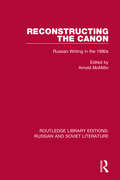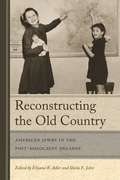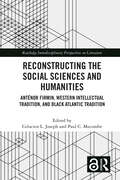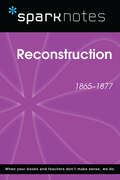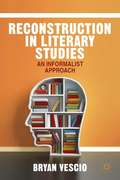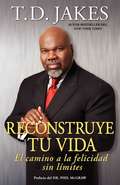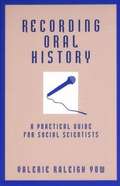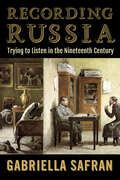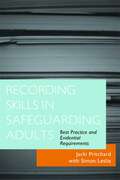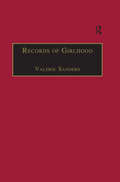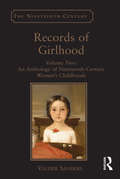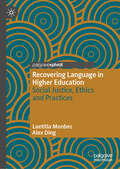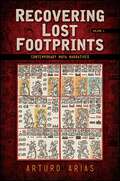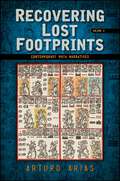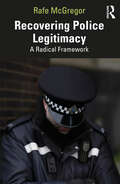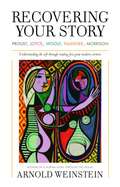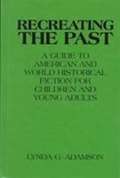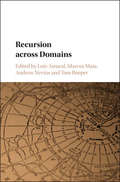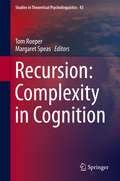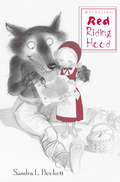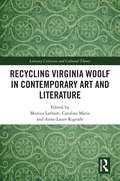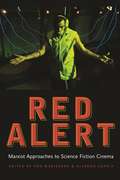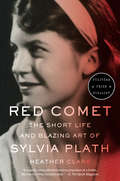- Table View
- List View
Reconstructing the Canon: Russian Writing in the 1980s (Routledge Library Editions: Russian and Soviet Literature #10)
by Arnold McMillinThis book, first published in 2000, features analyses about and by some of the most important Russian writers of the 1980s, a period of great changes in the cultural life of Russia when the controls of Soviet communism gave way to a wide diversity of unfettered writing. A variety of critical approaches matches the diversity of Russian writers considered here. The book features David Bethea’s theoretical discussion of the work of the outstanding critic and cholar Iurii Lotman and a fascinating extending interview with leading poet Ol’ga Sedakova. Several writers and works receive their first scholarly analyses in English, such as Sasha Sokolov’s complex postmodern novel, Between Dog and Wolf, Elena Shvarts’s poetry, and Zinovii Zinik’s work. Aleksandr Zinov’ev’s prose is subjected to a searching formal analysis. The book contains an essay on the literary environment of the Moscow poet Mikhail Aizenberg, and a highly controversial article that reviews Russian writing as an extension of imperialism. Writers who for various reasons fell into opprobrium during the 1980s include the Soviet village writers and the late Andrei Siniavskii (Abram Tertz). A survey of urban prose in the late 1980s looks into an uncertain future, while playwright Viktor Slavkin represents the best of contemporary Russian drama.
Reconstructing the Old Country: American Jewry in the Post-Holocaust Decades
by Eliyana R. Adler Sheila E. JelenThe 1950s and early 1960s have not traditionally been viewed as a particularly creative era in American Jewish life. On the contrary, these years have been painted as a period of inactivity and Americanization. As if exhausted by the traumas of World War II, the American Jewish community took a rest until suddenly reawakened by the 1967 Six-Day War and its implications for world Jewry. Recent scholarship, however, has demonstrated that previous assumptions about the early silence of American Jewry with regard to the Holocaust were exaggerated. And while historians have expanded their borders and definitions to encompass the postwar decades, scholars from other disciplines have been paying increasing attention to the unique literary, photographic, artistic, dramatic, political, and other cultural creations of this period and the ways in which they hearken back to not only the Holocaust itself but also to images of prewar Eastern Europe. Reconstructing the Old Country: American Jewry in the Post-Holocaust Decades brings together scholars of literature, art, history, ethnography, and related fields to examine how the American Jewish community in the post-Holocaust era was shaped by its encounter with literary relics, living refugees, and other cultural productions which grew out of an encounter with Eastern European Jewish life from the pre-Holocaust era. In particular, editors Eliyana R. Adler and Sheila E. Jelen are interested in three different narratives and their occasional intersections. The first narrative is the real, hands-on interaction between American Jews and European Jewish refugees and how the two groups influenced one another. Second were the imaginative reconstructions of a wartime or prewar Jewish world to meet the needs of a postwar American Jewish audience. Third is the narrative in which the Holocaust was mobilized to justify postwar political and philanthropic activism. Reconstructing the Old Country will contribute to the growing scholarly conversation about the postwar years in a variety of fields. Scholars and students of American Jewish history and literature in particular will appreciate this internationally focused scholarship on the continuing reverberations of the Second World War and the Holocaust.
Reconstructing the Social Sciences and Humanities: Anténor Firmin, Western Intellectual Tradition, and Black Atlantic Tradition (Routledge Interdisciplinary Perspectives on Literature)
by Celucien L. JosephJoseph Anténor Firmin (1850–1911) was the reigning public intellectual and political critic in Haiti in the nineteenth century. He was the first “Black anthropologist” and “Black Egyptologist” to deconstruct the Western interpretation of global history and challenge the ideological construction of human nature and theories of knowledge in the Western social sciences and the humanities. As an anti-racist intellectual and cosmopolitan thinker, Firmin’s writings challenge Western ideas of the colonial subject, race achievement, and modernity’s imagination of a linear narrative based on the false premises of social evolution and development, colonial history and epistemology, and the intellectual evolution of the Aryan-White race. Firmin articulated an alternative way to study global historical trajectories, the political life, human societies and interactions, and the diplomatic relations and dynamics between the nations and the races. Reconstructing the Social Sciences and Humanities is the first full-length book devoted to Joseph Anténor Firmin. It reexamines the importance of his thought and legacy, and its relevance for the twenty-first century’s culture of humanism, and the continuing challenge of race and racism.
Reconstructing the Social Sciences and Humanities: Anténor Firmin, Western Intellectual Tradition, and Black Atlantic Tradition (Routledge Interdisciplinary Perspectives on Literature)
by Paul C. Mocombe Celucien L. JosephJoseph Anténor Firmin (1850–1911) was the reigning public intellectual and political critic in Haiti in the nineteenth century. He was the first “Black anthropologist” and “Black Egyptologist” to deconstruct the Western interpretation of global history and challenge the ideological construction of human nature and theories of knowledge in the Western social sciences and the humanities. As an anti-racist intellectual and cosmopolitan thinker, Firmin’s writings challenge Western ideas of the colonial subject, race achievement, and modernity’s imagination of a linear narrative based on the false premises of social evolution and development, colonial history and epistemology, and the intellectual evolution of the Aryan-White race. Firmin articulated an alternative way to study global historical trajectories, the political life, human societies and interactions, and the diplomatic relations and dynamics between the nations and the races.Reconstructing the Social Sciences and Humanities is the first full-length book devoted to Joseph Anténor Firmin. It reexamines the importance of his thought and legacy, and its relevance for the twenty-first century’s culture of humanism, and the continuing challenge of race and racism.
Reconstruction (SparkNotes History Notes)
by SparkNotesReconstruction (1865-1877) (SparkNotes History Note) Making the reading experience fun! SparkNotes History Guides help students strengthen their grasp of history by focusing on individual eras or episodes in U.S. or world history. Breaking history up into digestible lessons, the History Guides make it easier for students to see how events, figures, movements, and trends interrelate. SparkNotes History Guides are perfect for high school and college history classes, for students studying for History AP Test or SAT Subject Tests, and simply as general reference tools.Each note contains a general overview of historical context, a concise summary of events, lists of key people and terms, in-depth summary and analysis with timelines, study questions and suggested essay topics, and a 50-question review quiz.
Reconstruction in Literary Studies
by Bryan VescioPointing the way toward a revitalized future for the study of literature, Reconstruction in Literary Studies draws on philosophical pragmatism to justify the academic study of literature. In turn, Vescio connects the changing field to its social function as an institution.
Reconstruye tu vida (Reposition Yourself)
by T. D. JakesEn su œltimo libro, Reconstruye tu vida, el exitoso autor T.D. Jakes brinda consejos que ayudar n a los lectores a ajustarse a los muchos cambios que la vida trae. ƒste es un llamado a despertar y hacerte cargo de tu vida ÁAhora! Este libro no s--lo aborda las zonas donde la pasividad o incluso las decisiones torpes han ahogado la creatividad del lector, sino que tambiŽn instruye sobre la manera de controlar los cambios y sacarle el m ximo de provecho a la vida. ValiŽndose del conocimiento adquirido en m s de treinta a-os de ejercer la consejer'a y de trabajar tanto con personas ordinarias como con destacadas personalidades, Jakes abarca la creatividad econ--mica, relacional y espiritual y muestra c--mo el adaptarse a momentos de transici--n en la vida es el camino para una existencia llena de satisfacci--n en todas sus etapas. Reconstruye tu vida ofrece planes concretos para aquellos que aspiran a un futuro m s productivo. Jakes acepta la inevitabilidad del cambio, te ense-a c--mo esperarlo y asumirlo en lugar de temerle. Mezclando conocimientos religiosos y seculares, comparte una combinaci--n singular de f--rmulas pr cticas y pragm ticas pareja a la sabidur'a de la Escritura por la que Žl se destaca. Este libro es sin duda una restauraci--n para el alma. Te capacita para tener Žxito y te ofrece los instrumentos necesarios para alcanzar las ilimitadas posibilidades que resultan de hacer peque-os ajustes en tus ideas y planes. Jakes cree que no hay nada m s importante que la pr--xima decisi--n que vayas a tomar. Antes de hacer otra elecci--n, ÁŽsta es una lectura obligada!
Recording Oral History: A Practical Guide for Social Scientists
by Valerie Raleigh YowHandy tips from developing a written interview guide and using tape recorders, to asking probing questions during the interview and editing transcriptions. The author also covers the ethical and legal issues involved in conducting life history interviews and elaborates on three types of oral history projects: community studies, biographies, and family histories.
Recording Russia: Trying to Listen in the Nineteenth Century
by Gabriella SafranRecording Russia examines scenes of listening to "the people" across a variety of texts by Russian writers and European travelers to Russia. Gabriella Safran challenges readings of these works that essentialize Russia as a singular place where communication between the classes is consistently fraught, arguing instead that, as in the West, the sense of separation or connection between intellectuals and those they interviewed or observed is as much about technology and performance as politics and emotions. Nineteenth-century writers belonged to a distinctive media generation using new communication technologies—not bells, but mechanically produced paper, cataloguing systems, telegraphy, and stenography. Russian writers and European observers of Russia in this era described themselves and their characters as trying hard to listen to and record the laboring and emerging middle classes. They depicted scenes of listening as contests where one listener bests another; at times the contest is between two sides of the same person. They sometimes described Russia as an ideal testing ground for listening because of its extreme cold and silence. As the mid-century generation witnessed the social changes of the 1860s and 1870s, their listening scenes revealed increasing skepticism about the idea that anyone could accurately identify or record the unadulterated "voice of the people." Bringing together intellectual history and literary analysis and drawing on ideas from linguistic anthropology and sound and media studies, Recording Russia looks at how writers, folklorists, and linguists such as Turgenev, Dostoevsky, and Vladimir Dahl, as well as foreign visitors, thought about the possibilities and meanings of listening to and repeating other people's words.
Recording Skills in Safeguarding Adults
by Jacki Pritchard Simon LeslieRecording Skills in Safeguarding Adults is the comprehensive guide to keeping accurate, effective and complete records in safeguarding adults work. This book explains why good record-keeping is essential: it covers crucial skills in recording, including how to write effectively; evidential requirements when writing statements and reports for court; and minute-taking. The book includes best practice points, exercises and examples of good recording. Each chapter also features informative, anecdotal experiences and comments from experts in safeguarding adults work, including police and lawyers, on what is needed in written records and how to present evidence clearly and persuasively. This book is essential reading for all safeguarding adults practitioners who are required to keep records, including social workers, probation officers, nurses, support workers, residential and day care staff, volunteers and advocates.
Records of Girlhood: An Anthology of Nineteenth-Century Women’s Childhoods (The Nineteenth Century Series)
by Valerie SandersThis anthology brings together for the first time a collection of autobiographical accounts of their childhood by a range of prominent nineteenth-century literary women. These are strongly individualised descriptions by women who breached the cultural prohibitions against self writing, especially in the attention given to psychologically formative incidents and memories. Several offer detailed accounts of their inadequate schooling and their keen hunger for knowledge: others give new insights into the dynamics of Victorian family life, especially relationships with parents and siblings, the games they invented, and their sense of being misunderstood. Most contributors vividly describe their fears and fantasies, together with obsessive religious practices, and the development of an inner life as a survival strategy. This collection makes vital out-of-print material available to scholars working in the field of women’s autobiography, the history of childhood, and Victorian literature. The volume will also appeal to general readers interested in biography, autobiography, the history of family life, education, and women’s writing: read alongside Victorian women’s novels it offers an intriguing commentary on some of their key themes.
Records of Girlhood: Volume Two: An Anthology of Nineteenth-Century Women’s Childhoods (The Nineteenth Century Series)
by Valerie SandersIn this sequel to her 2000 anthology, Valerie Sanders again brings together an influential group of women whose autobiographical accounts of their childhoods show them making sense of the children they were and the women they have become. The fourteen women included juxtapose recollections of the bizarre with the quotidian and accounts of external events with the development of a complex inner life. Reading and acting are important themes, as is the precariousness of childhood, whether occasioned by a father's financial pressures or the early death of a parent. Significantly, most grew up expecting to earn their own living. The collection includes children's authors (Frances Hodgson Burnett and E. Nesbit), political figures (Emmeline Pankhurst and Louisa Twining), and well-known writers (Mary Elizabeth Braddon, Anne Thackeray Ritchie, Sarah Grand). Of relevance to scholars working in the fields of women’s autobiography, the history of childhood, and Victorian literature, this anthology includes a scholarly introduction and brief biographical sketches of each woman.
Recovering Language in Higher Education: Social Justice, Ethics and Practices
by Alex Ding Laetitia MonbecThis volume provides an original theoretical and practical discussion around language ontology, social theory, ethics, and pedagogy to enhance socially committed teaching and scholarship in Higher Education. The authors focus on language and literacy and English for Academic Purposes provisions in HE and bring together social semiotics (Systemic Functional Semiotics) and Bourdieu’s Field Theory to illuminate the norms and orthodoxies which shape practices in these fields. Part 1 aims to ‘break the illusio’ around language ontology, ethics and pedagogy which hinders social justice aspirations. Part 2 proposes ways to recover meaning and move forward, through deliberate ethical considerations, and a detailed and expanded knowledgebase for language educators. The volume will be of interest to anyone involved in language and literacy in Higher Education.
Recovering Lost Footprints, Volume 1: Contemporary Maya Narratives
by Arturo AriasRecovering Lost Footprints is the first full-length critical study to analyze Latin American Indigenous literary narratives in a systematic manner. In the book, Arturo Arias looks at Maya narratives in Guatemala. The study of these works is intended to spark changes so that constitutions recognize these cultures, their rights, their languages, their centers of worship, and their cosmologies. Through this study, Arias problematizes the partial or full omission of Latin America's original inhabitants from recognized citizenry. This book analyzes these elements of exclusion in the novelistic output of three salient figures, Luis de Lión, Gaspar Pedro González, and Víctor Montejo. The works by these writers offer evidence that most native people have entered modernity without renouncing their respective cultures or the specifics of their singular identities. The philosophical ethics elaborated in the texts, such as respect for nature and recognition of the holistic value of natural beings, enable non-Indigenous readers to both understand and relate to these values.
Recovering Lost Footprints, Volume 2: Contemporary Maya Narratives
by Arturo AriasRecovering Lost Footprints, Volume 2 is an in-depth analysis of the sociohistorical conflict impacting Indigenous communities in Latin America. Continuing the project he began in volume 1, Arturo Arias analyzes contemporary Peninsular and Chiapanecan Maya narratives. He examines the works of Yucatecan writers Jorge Cocom Pech, Javier Gómez Navarrete, Isaac Carrillo Can, and Marisol Ceh Moo. For Chiapas, Arias looks at the works of Tseltal novelist Diego Méndez Guzmán, Tsotsil short-story writer Nicolás Huet Bautista, and Tseltal narrative writer Josías López Gómez. Arias problematizes the nature of Western modernity and the crisis of Western models of development in the present. By way of his analysis, he suggests that we are facing a historical impasse because we have neglected native knowledges that offer alternative codes of ethics and beingness that emerge from Indigenous cosmovisions. The text skillfully contributes to and strengthens debates between US-centered and Latin American cultural studies theorists, as well as the hemispheric expansion of Native American and Indigenous Studies. Recovering Lost Footprints, Volume 2 is inspired more by the past as it impinges upon a continuing, constantly expanding present. Arias's reading of Maya literatures forces us to reconsider the space-time structure of Western thinking. Indeed, this book is intriguing precisely because it views literature from an Indigenous perspective, evidencing how that social space is full of multiple contrasting experiences and historical processes.
Recovering Police Legitimacy: A Radical Framework
by Rafe McGregorTransatlantic policing is experiencing an unprecedented crisis of legitimacy, epitomised by public responses to the murders of George Floyd and Sarah Everard during the COVID-19 pandemic. Legitimacy is lost when the police either fail to protect the public or rely on coercion rather than consent to achieve that protection. Recovering Police Legitimacy challenges conventional criminological, political, and public solutions to the problem by approaching it from the bottom up, beginning with policing as a practice constituted by a unique set of excellences, skills, and characteristics.The author draws on his experience as a police officer and on the serial fictions of James Ellroy, David Peace, and Nic Pizzolatto to characterise the practice in terms of heroic struggle, edgework, absolute sacrifice, and worldmaking. These characteristics provide an analytic tool for revolutionising our understanding of the relations among policing as a situated practice, public protection, and police legitimacy and for identifying the different levels at which legitimacy is undermined. His conclusion is that recovery is possible but will be slow in pace and incomplete in scope.Written accessibly for students, police officers, policymakers, scholars, and anyone with an interest in police legitimacy, this is a groundbreaking study of a pressing social problem.
Recovering Your Story: Proust, Joyce, Woolf, Faulkner, Morrison
by Arnold WeinsteinGreat art discovers for us who we are," writes literature professor and critic Weinstein in this book about how we can better uncover and understand our own stories by reading five major modern writers who "reinvent the novel by exploding our sense of what we are." He invites us to discover our perceptions, our dreams, our own elusive, deepest stories in these masterpieces of modernist fiction. As he argues with wit and passion, these works are in fact shimmering mirrors of our own inner world and most intimate thoughts. He decodes great novels, illuminates the complex pleasures woven into these peerless narratives, and shows how to read them to understand human beings-the way our minds and hearts actually work. This is what Weinstein means by "recovering your story." He makes these powerful works understandable, accessible, indeed imperative for all adventurous readers
Recreating The Past: A Guide to American and World Historical Fiction for Children and Young Adults
by Lynda G. AdamsonSpanning grades 1-10, this annotated bibliography of 970 recommended American and world titles published through early 1994 includes adult titles suitable for young adult readers, with some 200 of the titles being award winners. Geographical sections are divided into historic time periods within which entries are organized alphabetically by author. Each entry contains both reading and interest grade levels, a short annotation about the historical event, setting, plot, protagonist and theme, current publication availability, and awards won. Seven appendices allow for a variety of search parameters. Originally announced as Historical Fiction for Children. . . . Annotation c. by Book News, Inc. , Portland, Or.
Recursion across Domains
by Tom Roeper Andrew Nevins Luiz Amaral Marcus MaiaRecursion and self-embedding are at the heart of our ability to formulate our thoughts, articulate our imagination and share with other human beings. Nonetheless, controversy exists over the extent to which recursion is shared across all domains of syntax. A collection of 18 studies are presented here on the central linguistic property of recursion, examining a range of constructions in over a dozen languages representing great areal, typological and genetic diversity and spanning wide latitudes. The volume expands the topic to include prepositional phrases, possessives, adjectives, and relative clauses - our many vehicles to express creative thought - to provide a critical perspective on claims about how recursion connects to broader aspects of the mind. Parallel explorations across language families, literate and non-literate societies, children and adults are investigated and constitutes a new step in the generative tradition by simultaneously focusing on formal theory, acquisition and experimentation, and ecologically-sensitive fieldwork, and initiates a new community where these diverse experts collaborate.
Recursion: Complexity in Cognition
by Tom Roeper Margaret SpeasThis volume focuses on recursion and reveals a host of new theoretical arguments, philosophical perspectives, formal representations and empirical evidence from parsing, acquisition and computer models, highlighting its central role in modern science Noam Chomsky, whose work introduced recursion to linguistics and cognitive science and other leading researchers in the fields of philosophy, semantics, computer science and psycholinguistics in showing the profound reach of this concept into modern science. Recursion has been at the heart of generative grammar from the outset Recent work in minimalism has put it at center-stage with a wide range of consequences across the intellectual landscape The contributor to this volume both advance the field and provide a cross-sectional view of the place that recursion takes in modern science.
Recycling Red Riding Hood (Children's Literature and Culture #Vol. 23)
by Sandra BeckettSandra Beckett's book explores the contemporary retelling of the Red Riding Hood tale in Western children's literature.
Recycling Virginia Woolf in Contemporary Art and Literature (Literary Criticism and Cultural Theory)
by Monica Latham Caroline Marie Anne-Laure RigeadeRecycling Virginia Woolf in Contemporary Art and Literature exam>ines Woolf’s life and oeuvre from the perspective of recycling and pro>vides answers to essential questions such as: Why do artists and writers recycle Woolf’s texts and introduce them into new circuits of meaning? Why do they perpetuate her iconic fgure in literature, art and popular culture? What does this practice of recycling tell us about the endurance of her oeuvre on the current literary, artistic and cultural scene and what does it tell us about our current modes of production and consumption of art and literature? This volume offers theoretical defnitions of the concept of recycling applied to a multitude of specifc case studies. The reasons why Woolf’s work and authorial fgure lend themselves so well to the notion of recy>cling are manifold: frst, Woolf was a recycler herself and had a personal theory and practice of recycling; second, her work continues to be a prolifc compost that is used in various ways by contemporary writers and artists; fnally, since Woolf has left the original literary sphere to permeate popular culture, the limits of what has been recycled have ex>panded in unexpected ways. These essays explore today’s trends of fab>ricating new, original artefacts with Woolf’s work, which thus remains completely relevant to our contemporary needs and beliefs
Recycling Virginia Woolf in Contemporary Art and Literature (Literary Criticism and Cultural Theory)
by Monica Latham Caroline Marie Anne-Laure RigeadeRecycling Virginia Woolf in Contemporary Art and Literature exam>ines Woolf’s life and oeuvre from the perspective of recycling and pro>vides answers to essential questions such as: Why do artists and writers recycle Woolf’s texts and introduce them into new circuits of meaning? Why do they perpetuate her iconic fgure in literature, art and popular culture? What does this practice of recycling tell us about the endurance of her oeuvre on the current literary, artistic and cultural scene and what does it tell us about our current modes of production and consumption of art and literature?This volume offers theoretical defnitions of the concept of recycling applied to a multitude of specifc case studies. The reasons why Woolf’s work and authorial fgure lend themselves so well to the notion of recy>cling are manifold: frst, Woolf was a recycler herself and had a personal theory and practice of recycling; second, her work continues to be a prolifc compost that is used in various ways by contemporary writers and artists; fnally, since Woolf has left the original literary sphere to permeate popular culture, the limits of what has been recycled have ex>panded in unexpected ways. These essays explore today’s trends of fab>ricating new, original artefacts with Woolf’s work, which thus remains completely relevant to our contemporary needs and beliefs
Red Alert: Marxist Approaches to Science Fiction Cinema (Contemporary Approaches to Film and Media Series)
by Ewa Mazierska Alfredo SuppiaIn Red Alert: Marxist Approaches to Science Fiction Cinema, editors Ewa Mazierska and Alfredo Suppia argue that Marxist philosophy, science fiction, and film share important connections concerning imaginings of the future. Contributors look at themes across a wide variety of films, including many international co-productions to explore individualism versus collectivism, technological obstacles to travel through time and space, the accumulation of capital and colonization, struggles of oppressed groups, the dangers of false ideologies, and the extension of the concept of labor due to technological advances. Red Alert considers a wide swath of contemporary international films, from the rarely studied to mainstream science fiction blockbusters like The Matrix. Contributors explore early Czechoslovak science fiction, the Polish-Estonian co-productions of director Marek Piestrak, and science fiction elements in 1970s American blaxploitation films. The collection includes analyses of recent films like Transfer (Damir Lukacevic), Avalon (Mamoru Oshii), Gamer (Mark Neveldine and Brian Taylor), and District 9 and Elysium (Neill Blomkamp), along with more obscure films like Alex Rivera's materialist science fiction works and the Latin American zombie films of Pablo Parés, Hernán Sáez, and Alejandro Brugués. Contributors show that the ambivalence and inner contradictions highlighted by the films illustrate both the richness of Marx's legacy and the heterogeneity and complexity of the science fiction genre. This collection challenges the perception that science fiction cinema is a Western or specifically American genre, showing that a broader, transnational approach is necessary to fully understand its scope. Scholars and students of film, science fiction, and Marxist culture will enjoy Red Alert.
Red Comet: The Short Life and Blazing Art of Sylvia Plath
by Heather Clark&“Finally, the biography that Sylvia Plath deserves . . . A spectacular achievement.&” —Ruth Franklin, author of Shirley Jackson: A Rather Haunted LifeThe highly anticipated new biography of Sylvia Plath that focuses on her remarkable literary and intellectual achievements, while restoring the woman behind the long-held myths about her life and art.With a wealth of never-before-accessed materials--including unpublished letters and manuscripts; court, police, and psychiatric records; and new interviews--Heather Clark brings to life the brilliant daughter of Wellesley, Massachusetts who had poetic ambition from a very young age and was an accomplished, published writer of poems and stories even before she became a star English student at Smith College in the early 1950s. Determined not to read Plath's work as if her every act, from childhood on, was a harbinger of her tragic fate, Clark evokes a culture in transition, in the shadow of the atom bomb and the Holocaust, as she explores Plath's world: her early relationships and determination not to become a conventional woman and wife; her conflicted ties to her well-meaning, widowed mother; her troubles at the hands of an unenlightened mental-health industry; her Cambridge years and thunderclap meeting with Ted Hughes, a marriage of true minds that would change the course of poetry in English; and much more. Clark's clear-eyed portraits of Hughes, his lover Assia Wevill, and other demonized players in the arena of Plath's suicide promotes a deeper understanding of her final days, with their outpouring of first-rate poems. Along with illuminating readings of the poems themselves, Clark's meticulous, compassionate research brings us closer than ever to the spirited woman and visionary artist who blazed a trail that still lights the way for women poets the world over.
